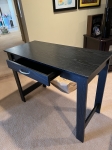Elevated CO level in house?
CO is deadly.
You may be able to call the fire department non-emergency number and get a second reading. I believe they can do this.
You should call but the idea that a contractor would say you have a dangerous level of CO and then only advise that you replace the boiler, rather than advising you to call the FD or the gas company, seems odd.
There is a chimney sweep company that sends a dolt to your house and tells you your chimney is blocked and will kill you. If you decline the service, he calls the fire department as an emergency. It happened at our house about 4 years ago.
Fire dept. guy came and said nothing is wrong.
snowmom said:
A "routine" check of our furnace [technically a boiler] revealed leaking CO, and replacement of said 50+ yr old appliance advised post haste. The hand held meter measured anywhere from 1 ppm to 70 ppm, depending on where it was held.
Real concern or a scare tactic to purchase a new appliance immediately?
TIA for your opinion.
Leave a couple of basement windows cracked. And get a second opinion.
Wouldn't putting a CO alarm the basement be sufficient? The when its fixed or if there is no leak the alarm can be moved to a more useful place like the living room.
https://www.amazon.com/Kidde-Battery-Operated-Monoxide-KN-Copp-B-LPM/dp/B004Y6V5CI/ref=sr_1_1
Don’t move it, keep it there. Basements should have a CO and smoke alarms
BG9 said:
Wouldn't putting a CO alarm the basement be sufficient? The when its fixed or if there is no leak the alarm can be moved to a more useful place like the living room.
https://www.amazon.com/Kidde-Battery-Operated-Monoxide-KN-Copp-B-LPM/dp/B004Y6V5CI/ref=sr_1_1
- On every level of your home. In order to ensure that your home has maximum protection, it’s important to have a CO detector on every floor.
- Five feet from the ground. Carbon monoxide detectors can get the best reading of your home’s air when they are placed five feet from the ground.
- Near every sleeping area. If your CO levels get too high during the nighttime, it’s important that detectors can be heard by everyone sleeping in your home. Place your detectors close enough to every sleeping area so that they can awaken everyone in the case of an emergency.
- Near attached garages. Cars produce carbon monoxide any time they are running. If you have an attached garage, those gasses can quickly spread to the rest of your house. A CO detector near your attached garage will warn you if that becomes a problem.
- Where the manufacturer recommends. Every model of carbon monoxide detector is tested according to manufacturer specifications. It’s important to take those specifications into account when you’re deciding where to place your detectors.
ps - they're very loud. I don't think they need to be placed near every sleeping area. Maybe one on each floor.
I've seen fancy home CO detectors that actually show the reading in the past (haven't checked recently). you can try calling the FD non emergency number, but they may just send all trucks lights and sirens.
Don't you already have a CO detector in the house? I think 1 is recommended for every floor at minimum, just not right next to any thing that could produce CO...i'd have to look it up to confirm.
https://www.mcair.com/resources/carbon-monoxide-the-silent-killer
0-9 ppm CO: no health risk; normal CO levels in air. 10-29 ppm CO: problems over long-term exposure; chronic problems such as headaches, nausea. ... 100+ ppm CO: severe symptoms; confusion, intense headaches; ultimately brain damage, coma, and/or death, especially at levels 300-400+ ppm.
Who provided this advice? Is it someone you trust? I agree with several of the above posters. If there is a dangerous level of CO in the basement, the basement needs to be ventilated, source of the leak identified and remediated. Just recommending replacement of the boiler seems strange. There should be a CO detector near the boiler since boilers can leak CO. If in doubt as to the initial finding you received, call for a second opinion ASAP. Fire Department or gas utility should provide a trusted reading. There are a number of trusty plumbers recommended regularly on this board you can call if you prefer. A yearly boiler inspection/servicing is recommended at the start of the heating season.
It is code to have a smoke detector within a certain distance of each bedroom door, and also at the base of the stairs to the basement. There are a few other locations that are needed to meet code that I can’t remember off the top of my head. I don’t recall if CO detectors are part of the code, but why take chances. We bought combo units. How loud they are can be hampered by how large a house is, so we have connected ones where if one goes off they all go off. For example, if one went off in either the basement or our playroom we would never hear it from our bedroom
found recommendation that the detector be at least 1 meter away from the appliance.
For Sale
Sponsored Business
Promote your business here - Businesses get highlighted throughout the site and you can add a deal.



















A "routine" check of our furnace [technically a boiler] revealed leaking CO, and replacement of said 50+ yr old appliance advised post haste. The hand held meter measured anywhere from 1 ppm to 70 ppm, depending on where it was held.
Real concern or a scare tactic to purchase a new appliance immediately?
TIA for your opinion.